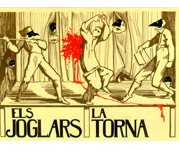


Premiere the 7th september de 1977 al Teatro Argensola (Barbastro)
Shown until the 30th november 1977
“Torna”: The quantity which you hand over to a person who has acquired something from you at a price greater than its worth. When a product sold doesn’t exactly match up to its indicated weight, the ‘torna’ is what is added to complete the said weight.
On the 3rd May 1973 Puig Antich and the Pole, Heinz Chez were executed in Barcelona and Tarragona, respectively. Of the first much has been said and continues to be said, given that he was a political prisoner. Heinz Txez, however, died shamefully, branded with the stigma of being a common criminal. In any case, the paradoxical part was that his execution had political ends, constituting the torna of the execution of Puig Antich with the result of disorientating public opinion predisposed, at that moment, to confusing the terms ‘political activist’ and ‘common criminal’.
The pathetic life of Heinz Chez is practically unknown, even to those who dealt intimately with him. According to his trial, Heinz was an enigmatic man of whom we know very little. His own account of his life tells of the death of his parents during the war when he was five, his internment in a children’s concentration camp, his profession as a street comedian to earn a living, his solitary wanderings across diverse countries until the day he shot a civil guard dead in a camp in Tarragona.
Neither before nor after his execution was anyone found to have known him, not even a family member or friend. He was, without a doubt, an authentic loner who went to the vile garrotte without anyone knowing anything about his character or conduct (even his name could have been false).
This performance has been created as a free interpretation of the events, with two specific aims; a homage to the street comedian Heinz Chez and as a reminder of one of so many injustices committed in the name of the law, a law which trusts that time will bury the past.
We don’t intend it to be a tragedy but a grand comedy of masks, just as Heinz, from both the events and people surrounding him, must have seen it in the end, given that he didn’t know the language, customs, laws or legal rights of the Spanish state.
We wanted to present the performance with simplicity, in both visual and narrative elements, because some of the scenes depict real events.
Elisa CREHUET
Míriam de MAETZU
Obdúlia PEREDO
Ferran RAÑÉ
Gabriel RENOM
Andreu SOLSONA
Arnau VILARDEBÓ
Director: Albert BOADELLA
Mask: Abdó MARTÍ
Costumes: Rosa CREHUET
Scenography: Els Joglars
Avui. Xavier Fàbregas
La torna es uno de los mejores espectáculos de Els Joglars, y el más maduro de
todos. Es una tragicomedia sutil, inteligente, el resultado de muchos años de
trabajo, de observación, de dominio profesional. Es una de los espectáculos
importantes que el teatro catalán ha producido en la década actual. Un
espectáculo que tienen que ver no sólo los espectadores habituales de nuestro
teatro, sino todos los que, en un sentido amplio, se interesan por nuestra
cultura.
La Vanguardia
Montaje polémico, por mucha unanimidad que alcanzara en la noche del
estreno que siendo modélico en lo puramente artístico, causará infinitas
molestias a determinados sectores sociales y puede dar lugar a muy violentas
reacciones.
El Correo. Pedro Barea
Els Joglars dan una visión satírica de los acontecimientos, su óptica va en busca
de los tics, de los gestos risibles de un recorrido macabro. Las máscaras de la
Commedia dell’Arte marcan una fantasmagoría guiñolesca en la que el único
personaje con rostro real es Heinz Chez. De algún modo se reproduce lo que
pudo ser la visión del protagonista, extraño, lejano, que no conocía el idioma en
el que le juzgaban y agarrotaban: aquel absurdo carnaval, para él ininteligible en
el que se jugó la vida.
Espectáculo muy mediterráneo y muy ibérico juega muchas veces con el empleo
intencionado del catalán y del castellano y recorre un arco expresivo que va
desde el más deslumbrante lirismo al chiste y al quiebro juguetón.